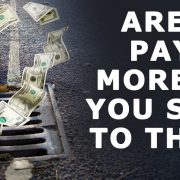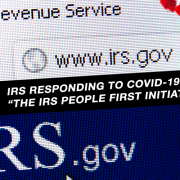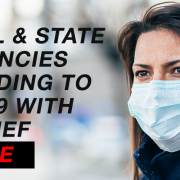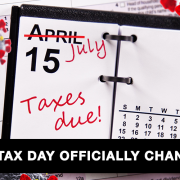How To Make Sure You Don’t Pay More Than What You Owe To The IRS
How To Make Sure You Don’t Pay More Than What You Owe To The IRS
I have not yet anyone who does not mind paying more to the IRS than they are legally obligated to. In fact it is a basic right known enumerated in the Taxpayer Bill of Rights that taxpayers pay no more than the correct amount of tax owed. But if a taxpayer fails to file an income tax return and thus leaves it up to the IRS to determine the amount of tax owed, the IRS will almost always come up with a higher amount with a “substitute return” it created.
Why You Should File Your Past Due Return Now
Avoid IRS Creating A “Substitute Return”
If you fail to file a Federal individual income tax return, the IRS may file a substitute return for you. This return usually will not give you credit for basis in assets sold, deductions and exemptions you may be entitled to receive. Thus the tax bill you will receive will be much higher than if you had filed an income tax return you had prepared. If the IRS files a substitute return, it is still in your best interest to file your own tax return to take advantage of any exemptions, credits and deductions you are entitled to receive. The IRS will generally adjust your account to reflect the correct figures.
Whether you file a tax return or a substitute return is created, the IRS will eventually generate a tax bill, which, if unpaid, will trigger the collection process. This can include such actions as a levy on your wages or bank account or the filing of a notice of federal tax lien.
If you repeatedly do not file, you could be subject to additional enforcement measures, such as additional penalties and/or criminal prosecution.
Claim A Refund
You risk losing your refund if you don’t file your return. If you are due a refund for withholding or estimated taxes, you must file your return to claim it within two years of the return due date. The same rule applies to a right to claim tax credits such as the Earned Income Credit. The IRS will hold income tax refunds in cases where the IRS shows that one or more income tax returns are past due. The IRS will hold them until the IRS gets the past due return(s) or receives an acceptable reason for not filing a past due return.
Protect Social Security Benefits
If you are self-employed and do not file your federal income tax return, any self-employment income you earned will not be reported to the Social Security Administration and you will not receive credits toward Social Security retirement or disability benefits.
Avoid Issues Obtaining Loans
Loan approvals may be delayed if you don’t file your return. Copies of filed tax returns must be submitted to financial institutions, mortgage lenders/brokers, etc., whenever you want to buy or refinance a home, get a loan for a business, or apply for federal aid for higher education.
Avoid Loss Of Passport Renewal Or Eligibility Privileges
Under section 32101 of the Fixing America’s Surface Transportation Act (“FAST Act”), signed into law in December 2015, the IRS is required to notify the State Department of taxpayers the IRS has certified as owing a seriously delinquent tax debt (currently more than $52,000 and meeting certain other requirements under Internal Revenue Code § 7345(b)). Also see Notice 2018-1. The FAST Act also requires the State Department to deny their passport application or deny renewal of their passport. In some cases, the State Department may revoke their passport.
Already Filed Your Past Due Return?
It takes approximately six weeks for IRS to process an accurately completed past due tax return so if in the interim you receive a notice from IRS inquiring on a late-filed tax return it has yet to receive, you should send to IRS a copy of the past due return to the indicated address on that notice.
Tips In Dealing With A Tax Bill Received From IRS
Make sure you really owe the money
If you owe a lot more tax than you expected, find out why. Read your completed return carefully and look for errors. It’s easy to add the same income twice, or to forget an important deduction. Maybe the IRS does not apply all your prior payments. If you expected to qualify for a deduction or credit, and your tax return doesn’t show it, make sure you answered all the questions correctly. One missed question or checkbox can cause you to miss out on tax benefits you may be entitled to.
Another way to determine if something is amiss is to compare this year’s return to your tax return from last year. If your tax situation has not changed drastically, but your tax bill has, find out why.
Just because you received a letter from the IRS that you owe money, don’t automatically assume the IRS is correct. They make mistakes, too.
Minimize penalties and interest
Large tax bills are worse when you pay penalties and interest on top of the original amount owed. You can minimize penalties and interest in three ways:
Exceptions to underpayment of tax penalties – If you underpaid your taxes this year, but you owed considerably less last year, you generally don’t pay a penalty for underpayment of tax if you paid or had withheld at least as much as you owed last year, and you pay by the due date this year. By looking at last year’s tax liability and other tax information, it can be determined if the safe harbor rule reduces your penalties and interest. You may also be able to reduce your penalties and interest using the annualized income method if you received more of your income in the latter part of the year.
Ask for an abatement of penalties – The IRS may reduce or remove penalties and interest on the penalties if a taxpayer writes a letter explaining the situation. But notice that the interest on the tax cannot be abated. In order to succeed, you must show “reasonable cause” which may be met where you had an unusual tax event, you made an honest mistake, or you or your spouse had a serious illness.
Pay as quickly as possible – If you owe tax that may be subject to penalties and interest, don’t wait until April 15th or if on extension October 15th to file your return. Send an estimated tax payment or file early and pay as much tax as you can.
See if you qualify for an Offer In Compromise or alternatively ask for an installment plan
If you can’t pay the tax by the time it is due, don’t avoid the bill. It will only get worse. The IRS must allow you to make payments on your overdue taxes if you owe $50,000 or less and you can show that you cannot pay the amount you owe now. In that situation you may qualify to pay off the tax in as long as six years. Of course, you must also agree to comply with the tax laws, and you or your spouse must not have had an installment agreement with the IRS in the past five years.
Because an installment plan does not allow for any discount of the amount owed and the balance will continue to accrue penalties and interest, serious consideration should be given to an Offer In Compromise (OIC).
What Should You Do?
Tax problems are usually a serious matter and must be handled appropriately so it’s important to that you’ve hired the best lawyer for your particular situation. The tax attorneys at the Law Offices Of Jeffrey B. Kahn, P.C. located in Orange County (Irvine), the San Francisco Bay Area (including San Jose and Walnut Creek) and elsewhere in California are highly skilled in handling tax matters and can effectively represent at all levels with the IRS and State Tax Agencies including criminal tax investigations and attempted prosecutions, undisclosed foreign bank accounts and other foreign assets, and unreported foreign income. If you are involved in cannabis, check out what our cannabis tax attorney can do for you. Also, if you are involved in crypto currency, check out what a bitcoin tax attorney can do for you.









 Follow
Follow Follow
Follow